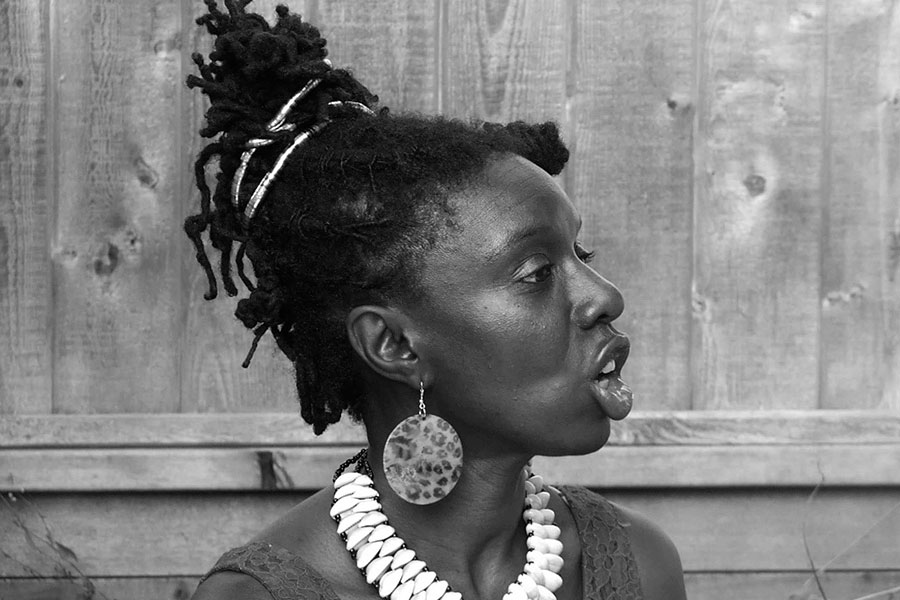Valerie Mason-John is available for leading workshops and professional training, as well as consulting with schools and organizations, in the fields of mindfulness and addiction, eating disorders, Buddhism, emotional trauma, anti-bullying, conflict resolution, restorative justice approaches in the classroom and workplace, unconscious bias, diversity, and leadership.

Training & Consultation
- Anti-bullying programs
- Conflict audits
- Restorative justice approaches
- Leadership training
- Community conference facilitation
- Crisis intervention
- One-on-one coaching
To inquire about booking Valerie at your event or organization please complete our contact form.

Mindfulness
Mindfulness is a type of meditation that enables us to be in the present moment. Mindfulness is becoming aware of the distractions in our daily lives, in our minds and hearts. When we become aware of our distractions, we are empowered to make a choice. We can either indulge in our distractions or come back to the task that we were initially focused on. Developing mindfulness in our daily lives allows us to function at our full potential.
Valerie is a certified professional Mindfulness Teacher. She teaches mindfulness for:
- Stress
- Addiction
- Digital addiction
- Negative emotions
- Unconscious bias
- Work places
Remember that old adage “take time out”? We tell kids to “take time out.” We tell adults to “take time out.” Time out gives us the opportunity and the choice to pause, to become reconnected to the breath and aware of our toxic thoughts. Time out can liberate us to do something different.
There is the gap between the feeling and thinking. This gap is where we can fall into the habitual behaviour of stoking our “stinking thinking.” We can only change a feeling if we change the thought that comes after the feeling. If we are mindful, we will recognize the toxic thought and choose a healthier thought. In turn, that thought will create a calmer feeling and release us from the vicious cycle of reacting that can ignite us to bully or create conflict situations. Minding the gap is mindfulness.
The Bully Doctor
Bullying is somebody stealing another person’s power. It is repetitive, negative and harmful.
Bullying can be a negative action whereby a person intentionally harms another person through verbal and/or non-verbal put downs or physical contact. Bullying can also be sexual harassment — somebody repeatedly making comments about someone’s body or looking at it in an inappropriate way. In our technological world, bullying has entered cyberspace. Bullying can range from hate pages, posting inappropriate photos on the internet, sexting, and assassin scam emails threatening to kill you.
Bullying is a type of conflict.
Conflict is inevitable. Conflict is an opportunity to do something different, an opportunity to be creative.
As a Bully Doctor, Valerie can specifically design a program to combat bullying in the work place or school to suit your needs. She investigates the dis-ease in the community. She identifies a diagnosis through an audit, consultation or meeting and prescribes a remedy for the issues, offering a program of work to put the conflicts and bullying into remission.
Valerie’s treatment is about repairing the harm and facilitating people to come together and dialogue. As a certified Life Coach, she will coach you to create balance and remove the obstacles that can hinder success. She offers restorative justice training in the classroom, for teachers, administrators, employers and anyone who is managing groups of people, to help keep conflict in remission.
Restorative Justice
It is a theory that when conflict arises, when a crime is committed, the consequences do not just impact the people directly involved. It impacts the whole community. Therefore when bullying occurs in the work place or at school it impacts the whole of the work or school communities. It fosters dialogue between the target and offender showing the highest rates of target satisfaction and offender accountability. In essence Restorative Justice is about acknowledging the harm that has been done and repairing the harm. It is by no means a punitive process.
- Restorative interventions seek to safely include all those affected by an incident in its resolution.
- Restorative intervention seek to facilitate an understanding of each other, helping resolve conflict and repair harm.
- Restorative interventions give the opportunity for the offender/s to make an amends and repair the harm where ever possible.
- Restorative interventions enables the offended person/people to state clearly how they have been affected, and how they would like the harm repaired.
Community Conference
This is the process that is used in Restorative Justice to facilitate a dialogue by all the people affected by an offending incident. It can be a short dialogue between two people, or it can be a longer dialogue between all those who have been directly and indirectly affected by the incident.
For a short or long conference to be effective the following must be in place:
- A willingness to take part by all parties. Nobody must be forced or coerced into taking part.
- There needs to be an admission that harm has been caused.
- All participants in the conference should be prepared before hand and procedure explained.
- Preferably based on a single incident, but sometimes that is not always appropriate.


